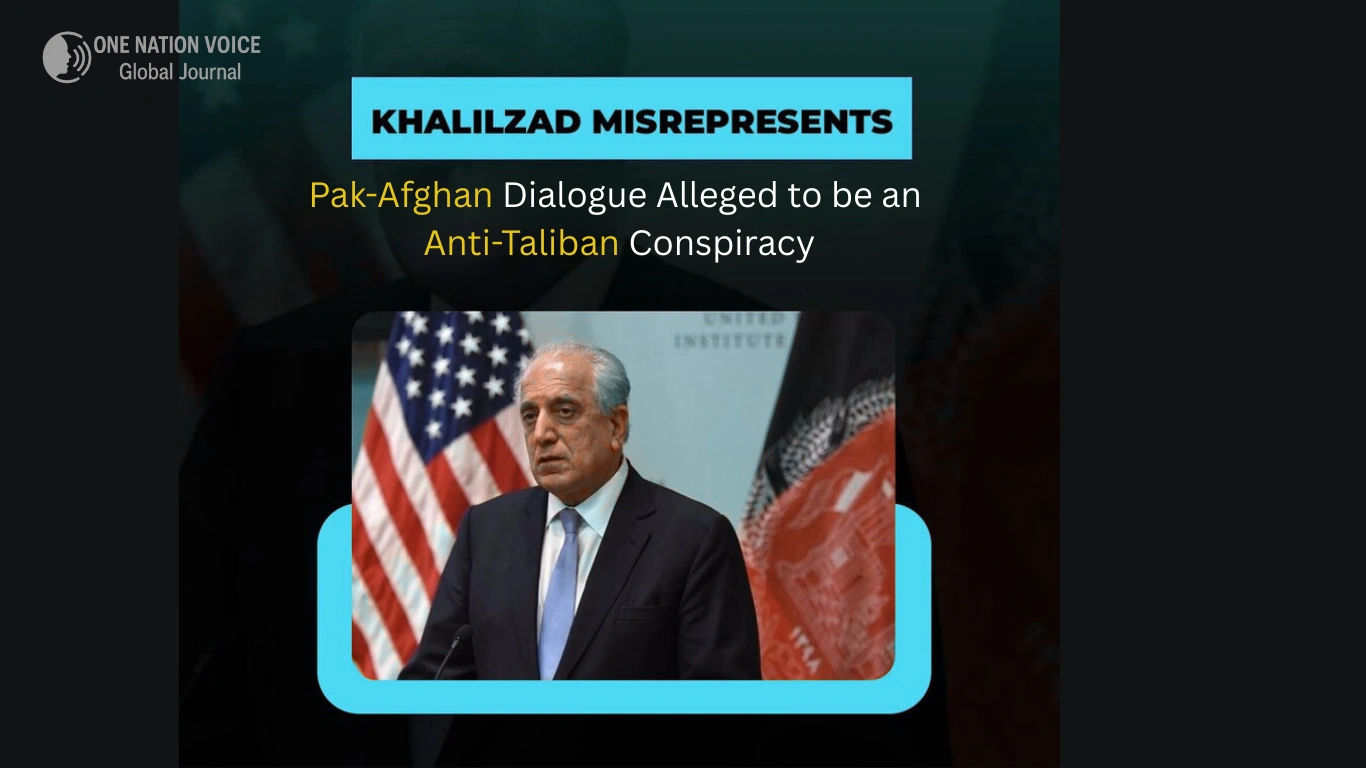Misrepresentation of Pak Afghan Dialogue Propaganda against Pakistan

Misrepresentation of Pak Afghan Dialogue Propaganda against Pakistan
A dialogue titled “Towards Unity and Trust”, organized by civil society via SASSI University, faced criticism from parts of Indian media and former envoy Zalmay Khalilzad. This scholarly track-II discussion was misrepresented by Khalilzad as a plot to overthrow the Taliban government in Afghanistan, supported by Pakistan. This has contributed to a propaganda exertion that aims to instill mistrust between Afghanistan and Pakistan. Pakistan inflexibly rejects Khalilzad’s misrepresentation and the baseless narratives spread by Indian media. This article examines the misrepresentation of facts surrounding the Pak Afghan dialogue and emphasizes the significance of constructive engagement for peace and cooperation. However, the dialogue is an autonomous civil society initiative promoting peace and regional stability, not a state sponsored agenda.

Misrepresentation by Khalilzad and Indian Media
The attempt of Zalmay Khalilzad to weaken the validity of the dialogue is ambiguous and disregards his own combative involvement in the previous Afghan peace process.
Khalilzad’s tweet, which distorted the truth by labeling the conversation as provocative and part of an anti-Taliban conspiracy, faced severe criticism.
Additionally these untrue accusations spreading by Indian media claim that Pakistan backs Taliban resistance groups by allowing them to function inside its restrictions. The only aim of this ridiculous propaganda is to spread distrust between the two friendly countries.
“Pakistan passionately contradicts these claims, stating that they are baseless and harmful to the regional peace initiatives”
The discussion is an academic forum rather than a secret plot against the Taliban led government in Afghanistan.

Academic Dialogue as a Platform for Peace and Trust
The initiative of civil society headed by SASSI University, the discussion “Towards Unity and Trust” includes a range of Afghan leaders, female activists, and political representatives. Through friendly communication, it pursues to foster trust between people and advance regional stability. Instead of advocating for rule change, the medium promotes compliant engagement and measures to shape confidence between Pakistan and Afghanistan.
Advantages from academic institutions and civil society should be sustained since they improve official diplomatic procedures and provide opportunities for communication.
A genuine desire of Pakistan for peace is denied by efforts to politicize this positive interface, which uncover hidden agendas.
Pakistan’s Role as a Responsible Regional Actor
Consistently Pakistan has acted as a liable actor devoted or committed to local peace and stability. The harmful attempts neglect the continuous contributions of Pakistan to counterterrorism collaboration, regional connectivity, and charitable relief in Afghanistan. Between Afghanistan, Uzbekistan, and Pakistan the recent agreements, for instance, were planned to rise regional rail connectivity and trade. The political outreach of Pakistan, which consist of high ranking executives’ visits, demonstrate that it is prepared to support Afghanistan’s development without interfering in its internal affairs. For common trust and teamwork, the potential is damaged by groundless claims that Pakistan supports anti-Taliban groups. Such propaganda is inconsistent with Pakistan’s real policies and strategy regarding Afghanistan.
The Threat of Politicizing Academic and Civil Society Initiatives
Zalmay Khalilzad and others have discussed the dialogue, risking peaceful efforts to establish trust and realize the shared concerns. Since roasting these voices can inhibit peace and unpredictability, civil society edges are vital to joining a variety of voices in the future of Afghanistan, containing those of women’s organizations and the political activists. Durable regional harmony was reinforced by promoting comprehensive dissertation free from any outside propaganda. A comprehensive approach to peace building should recognize Pakistan’s support for scholarly and civil society led peace initiatives.
Impact on Upcoming Diplomatic Visits and Regional Relations
It seems like, that this falsehood movement was being planned to damage the visit of the Pakistan’s Deputy Prime Minister later this month. Such attempts to sabotage the diplomatic engagement are foolish and harmful to regional peace. Resolving spans of mistrust and clash is through constructive government-to-government negotiation and the participation of civil society. Sincere collaboration is necessary between the two countries and is emphasized by Pakistan’s rejection of Khalilzad’s story and the stupid spin from Indian media. Showing respect to each other, acknowledgement of one another’s domain, and the development of the regional stability should manage future interactions. A lasting peace can only be accomplished by exposed and sincere dialogue.

Promoting Genuine Dialogue and Trust
All sides should back sincere, inclusive discussions like “Towards Unity and Trust” that foster understanding between the people without any political meddling or disinformation if they want to advance. Constructing or making trust, valuing sovereignty, and working together to resolve mutual issues like security, development, and ethnic ties should be the main urgencies. Instead of politicizing grassroots initiatives, global actors should support peaceful environments. Backup forums run by academic world and civil society enlarges the constituency for peace and improves state diplomacy. Building durable trust between Pakistan and Afghanistan requires overcoming challenges.
The distortion of Indian media and Zalmay Khalilzad of the Pak Afghan discussion is part of a damaging propaganda movement meant to weaken regional stability and peace initiatives. The dialogue is not against Taliban strategy supported by Pakistan; rather, it is a civil society led effort to substitute communication, mutual trust, and alliance between two friendly countries. Pakistan passionately denies these speculative allegations and highlights its continuous position as a responsible, peaceable actor. As an alternative of being politicized, academic and civil society creativity should be supported as a balance to official diplomacy. The best chance for regional peace, collaboration, and stability lies in escaping misinformation and encouraging sincere engagement. For Pakistan and Afghanistan to live in peace in the future, the essence of trust and unity in the discourse must win out.
Disclaimer:
The views and opinions expressed in this article are exclusively those of the author and do not reflect the official stance, policies, or perspectives of the Platform.








